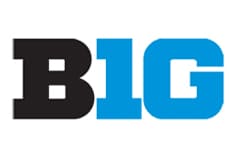

„There are expansion stories all over the country,” Delany said at what was officially basketball media day, „but we’re not part of any of them.”
That apparently includes zero discussions with Notre Dame as the relentless conference hopscotching continues everywhere and threatens the existence of the Big East — the home for the Irish’s non-football sports and therefore a key element in maintaining football independence.
„In the ’90s, we had active discussions with Notre Dame, and that was that,” Delany said. „We acknowledged it at the time, but we haven’t since.
„I had a discussion with (Notre Dame athletic director Jack Swarbrick) on hockey probably about three months ago, and I had another discussion with Jack on football and basketball scheduling issues that our conference was looking at. But on the issue of expansion — no. And have not, for years, really.”
Delany returned time and again to the theme that the Big Ten is „out of the discussion except as an interested observer” as far as conference expansion and realignment is concerned.
He acknowledged a never-say-never asterisk to any such proclamations. But he emphasized that Penn State and Nebraska — the last two expansion partners — approached the Big Ten first. And Delany said there is no seeking or approaching going on by the league at the moment.
„We made a couple decisions after Nebraska was added that we would monitor the situation for a while,” Delany said. „When a lot of other activities began, that was reaffirmed by our board.
„What I think about Louisville or West Virginia or Notre Dame or BYU is more as a sports fan than as a conference commissioner, because our conference is not involved in these issues. Except as an observer, monitoring. It’s been pretty clear and repeated on a number of occasions about how pleased we are about where we are.”
Beyond that, Delany wouldn’t even acknowledge whether any team, including Notre Dame, has approached the league.
„Hypothetical questions about West Virginia or Texas or USC or Notre Dame or Boston College — it’s not in our interests to answer hypothetical questions,” Delany said.
Adding Notre Dame and a second school — possibly Rutgers — could give the Big Ten an East Coast presence and additional boost in its next round of television negotiations.
The flip side, Delany said, is that some rivalries could be lost.
“We want to play ourselves,” he said, alluding to the league’s decision to increase its number of conference games from eight to nine beginning in 2017.
Oddly, the guy who started the Big Ten Network downplayed television’s role in expansion — at least as far as his league goes.
„Television contracts and expansion are a means to an end,” Delany said. „They’re not an end themselves. This is not Monopoly. This is not a game board, where people are collecting markets and territories and schools. Our goal, from the beginning, has been to have competition for teams and student-athletes against other universities that have the same feeling about how the enterprise ought to be conducted.
„There are some times when starting a network could benefit that. There are some times when expansion could benefit that. But it’s not about how many schools or how many states or how many markets – those are considerations any time you look at something, but for us, it’s always been about how you have the best set of competitive opportunities.”
But when Delany talked about Penn State and Nebraska joining because they believed in revenue sharing and centralization of television rights, it’s underscored the hurdles with Notre Dame and the money the school currently hauls in as an independent with its own NBC contract.
Delany wouldn’t speak, however, to the difficulties of remaining a football independent as the landscape changes.
„I don’t study that,” he said. „How difficult it is is a judgment call for them, not for me.”
And, currently, Delany’s overriding judgment call is to sit back, bask in the addition of Nebraska to his inventory, and see where things go.
„We know you could make a case for expansion,” Delany said. „But you don’t expand because you can make a case for it. It would have to be a compelling case.”
Source: Bleacher Report
